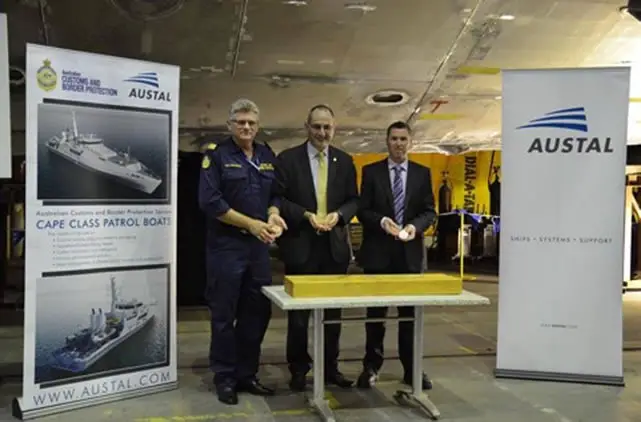Demonstrating
the rapid progress of the Cape Class Patrol Boat Program, Austal today
hosted the keel-laying ceremony for the third vessel, Cape Nelson, one
of eight 56-metre patrol boats that Austal is designing, building and
supporting for the Australian Customs and Border Protection Service. |
Keel-laying
traditionally marks the first significant milestone in a ship’s
construction. Historically this was the “laying down” of
the main timber making up the backbone of a vessel. Austal’s advanced
shipbuilding techniques means fabrication of ship modules begins well
before they are actually joined. So today Austal celebrates keel-laying
when modules are brought together for final assembly.
Although Austal’s design and manufacturing approach is thoroughly
modern, the ceremony retained long held shipbuilding traditions. This
included placing three specially minted coins under a keel block as
a symbol of good fortune and to bless the ship. These coins will be
removed just prior to the patrol boat’s launch.
The three coins were placed by Michael Pezzullo, Chief Executive Officer,
Australian Customs and Border Protection Services; David Brekenridge,
Chief Engineer Australian Customs and Border Protection Services; and
Graham Backhouse, President and General Manager Austal. In doing so,
the keel block was formally positioned by two of Austal’s high
achieving apprentices, Wes Ramshaw and Jacob Kerr.
Cape Class is a program of work that underpins Austal’s strategy
as a global defence prime contractor of Ships, Systems and Support.
It’s a program that has also enabled Austal to reposition and
strengthen the Henderson facilities as a defence-focused operation.
This total solution capability represents the future of the Australian
business as Austal continues to expand and enhance the strategic industry
capability necessary to meet the current and future defence needs of
Australia and other nations.
In doing so, the Cape Class Patrol Boats play a significant role in
protecting Australia’s borders from multiple maritime threats,
and have been designed to have greater range, endurance and flexibility,
as well as enhanced capability to operate in more severe sea conditions
than the current Customs and Border Protection fleet.
|

